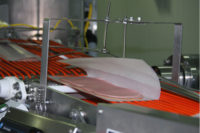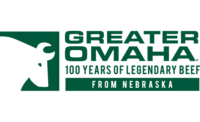Handle With [greater] Care
by Richard Mitchell
Cries to treat animals humanely prior to slaughter are being heard loud and clear by packers.
Proper handling of live animals not only is the morally correct thing to do, but it also makes very good business sense. As a result, humane-animal handling has taken on added significance in recent years.
With more foodservice companies, supermarkets, consumers, and advocacy groups demanding that food manufacturers follow stringent-care guidelines to ensure cattle, chickens, turkeys, and other food animals are treated humanely prior to slaughter, processors and packers are giving greater scrutiny to their methodologies, facilities, and employees.
Slaughter plants are adopting enhanced technologies and procedures to reduce animal stress and injury, and also enrich worker competencies. While industry improvements have been widespread since McDonald’s Corp. began mandating that its suppliers meet handling guidelines in 1999, getting all processors to consistently provide appropriate levels of animal care still remains a challenge.
"Slaughter plants are doing really good, but my biggest concern is that they don’t slack off," says Temple Grandin, associate professor of animal science at Colorado State University in Fort Collins, and a leading authority on animal handling. "Most of the big facilities have really good internal auditing systems, but you also have plants that will let things slip if the auditors don’t stay after them. Things go bad when you relax vigilance."
The McDonald’s audit incorporates many of the handling guidelines that Grandin previously devised for the U.S. Department of Agriculture and the Washington, D.C.-based American Meat Institute (AMI). It monitors supplier performance in such categories as cattle stunning, rendering cattle insensible prior to slaughter, electrical prodding of cattle, ramp and trailer flooring, and hog slippage and falls.
Because other large foodservice chains, including Wendy’s and Burger King, also require their suppliers to score satisfactorily on animal-handling audits, most large and medium-sized processors that serve major retailers have appropriate animal-care procedures in place. Smaller processors, whose customers do not always require such audits, often pay less attention to animal handling.
"All companies won’t meet the animal-care guidelines until their customers demand it," Grandin notes. "It’s a top-down motivated system."
And that is leading animal-care organizations to devise strategies to better educate consumers and retailers on the need for improved animal handling, and perhaps have them pressure suppliers to improve their techniques.
Processors that meet the handling guidelines of Herndon, VA-based Humane Farm Animal Care can display the organization’s "Certified Humane Raised and Handled" label on their product packages. The label program was launched in May 2003.
The group is promoting the initiative by running ads in local newspapers and processor trade publications, and posting information on the Web sites of two of its supporters — the American Society for the Prevention of Cruelty to Animals (ASPCA) and The Humane Society of the United States (HSUS). Fifteen processors currently use the label.
"Consumer demand will drive supplier improvements, but there is a long way to go before everyone becomes more humane," says Adele Douglass, Humane Farm Animal Care executive director. "Getting consumers to demand that their supermarkets and restaurants either sell or serve products with the Certified Humane Label could help get processors to be totally committed to humane handling, and not tolerate bad practices from their employees."
An evolving process
Fieldale Farms Corp., a Baldwin, GA-based broiler producer, is among the large array of suppliers that have upgraded their animal-handling tools and procedures in recent years. The processor remodeled its chicken houses and incorporated more efficient cool-cell pads and tunnel ventilation systems to reduce heat stress, says David Wicker, Fieldale Farms’ director of live production.
A cool cell pad is an evaporative cooling device that holds circulating water. The pads are attached to the outside walls of houses and are opposite large fans. The fans pull cooler air from the pads into the house and exhaust the warm air out of the building, dropping interior temperatures between 10ºF and 15°F, Wicker notes.
While such a system is not new, Fieldale Farms enhanced its effectiveness by replacing 2-inch and 4-inch pads with 6-inch cooling cells. "On a hot August day here, you would rather be inside a chicken house than outside," Wicker says. "You could not have made that statement fifteen years ago."
The processor also is providing financial rewards to workers who meet animal-handling performance criteria. Fieldale Farms, for instance, tracks how effective employees are in minimizing bruising and broken bones on chickens, and reducing bird deaths prior to their arrival at processing plants.
Such measures, along with a greater emphasis on supervisor training, led to a 150-percent reduction in DOAs, broken bones, and bruises over the last five years, says Steve Collier, Fieldale Farms vice president of operations.
"You’re not going to do one big thing and make a huge amount of progress," Wicker notes. "Improved animal handling is a series of small items, including being aware of problems, and having workers trained to observe procedures and then take action."
Many processors base their procedures and audits on guidelines developed by the various meat and poultry trade groups. The Washington, D.C.-based National Chicken Council (NCC) adapted an audit checklist and a list of best practices in 2003 that cover such areas as education, training and planning, hatchery operations, proper nutrition and feeding, appropriate comfort and shelter, prevention or rapid diagnosis and treatment of disease, and catching and transportation.
The Washington, D.C.-based National Turkey Federation (NTF), meanwhile, is updating its handling guidelines to reflect the availability of newer technologies. Alice Johnson, federation president, says more producers are realizing the importance of humane-animal handling for ethical and business purposes, and many are including handling in their plant operation audits.
"We can’t afford to abuse these animals because we need high-quality meat products," she notes. "If you treat the animals inhumanely, you’re going to see the effects throughout the process, including increases in mortality and disease."
To maintain high performance levels, many suppliers undergo frequent evaluations. Wyalusing, PA-beef processor Taylor Excel performs internal plant audits at least twice a week, and has third-party audits done four-to-six times a year, says Jerry Karczewski, operations manager.
The company also maintains a rigorous training program. All pen workers, for instance, must view videos that detail proper techniques for unloading and moving cattle, performing stunning operations, and evaluating insensibility (unconsciousness) on the kill floor. Workers also have to pass tests to become certified animal handlers.
Taylor Excel follows AMI guidelines. Karczewski says many of the company’s improvements are small but effective, such as replacing sharp right angles with curved corners in pens to enable cattle to move more freely.
"Lots of work has been done with chute design, but a bigger effort is being placed on training," adds John McGlone, a professor in the department of animal and food sciences at Texas Tech University, and president of FACTA LLC, a Lubbock, TX-based auditing firm. "Twenty years ago we weren’t sure if animal handling made a difference, but now we know it has a big influence on meat quality and the stress that the animals feel prior to being processed."
Continuous improvement
The greater awareness of the benefits from humane-animal handling is causing processors to consider additional improvements. Future projects are expected to center on transport and farm activities.
Indeed, the Food Marketing Institute (FMI) and the National Council of Chain Restaurants (NCCR), who jointly designed an Animal Welfare Audit Program to provide objective data on animal welfare at livestock production and slaughter facilities, already are looking to establish industry guidelines to cover farms.
"The public is getting more interested in animal welfare, and practices are going to get stronger," Grandin says. "It is here to stay." NP
Richard Mitchell is a freelance writer in the Chicago area.





